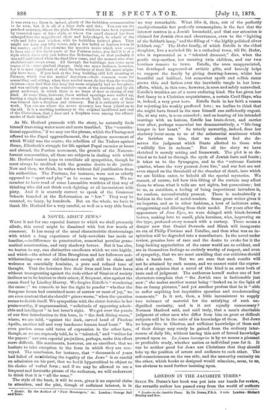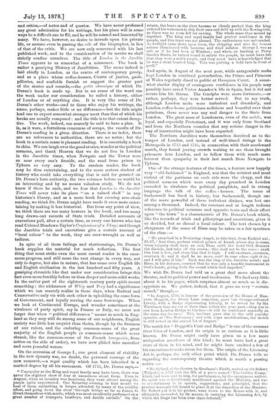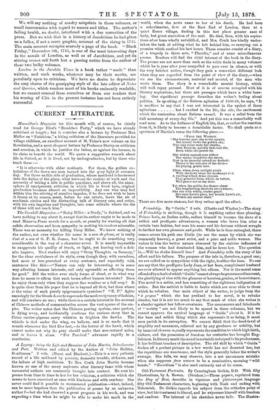LONDON IN THE JACOBITE TIMES.*
SnscE Dr. Doran's last book was put into our hands for review, the versatile author has passed away from the world of authors • Basile. By the Author of " Four Messengers," ac. London: George Bell •• London in the Jacobite Titnes. By Dr. Dersa,r.s.A. 2 vols. Londcin: Biehard and critics,—of notes and of queries. We have never professed
any great admiration for his writings, but his place will in some ways be a difficult one to fill, and he will be missed and lamented by
many. We have, however, no desire to intrude upon his private life, or assume even in passing the role of the biographer, in lieu
of that of the critic. We are now only concerned with his last published work, and to the consideration of its merits we shall
strictly confine ourselves. The title of London in the Jacobite Times appears to us somewhat of a misnomer. The book is
rather a gossiping History of Jacobitism. The scene indeed is laid chiefly in London, as the centre of contemporary gossip, and as a place whose coffee-houses, Courts of justice, gaols,
pillories, and scaffolds furnish or suggest the greater part of the stories and records,—the petite chronique of which Dr.
Doran's book is made up. But in no sense of the word can the work under our consideration be called a history, either
of London or of anything else. It is very like some of Dr.
Doran's other works—and to those who enjoy his writings, the name, perhaps, makes little or no difference—but the title might lead one to expect somewhat stronger meat than that of which his books are usually composed ; and the title is to that extent decep- tive. The work, indeed, can scarcely be said to have a plan. It is, as it were, a fortuitous concourse of scraps, the results of Dr. Doran's reading in a given direction. There is no index, there are no references to authorities, there are no notes ; but the book in a certain sense is pleasant reading. It is essentially a book
to skim. We can laugh over the good stories, wonder at the political sermons, and thank Heaven that we do not live in London in the Jacobite times, when Newgate and the Tower were so near every one's fireside, and the road from prison to Tyburn so very easy. To the careless reader, the book
may be thus entertaining, and to the more serious student of history who could take everything that is said for granted on Dr. Doran's bare authority, the two volumes before us would be
an interesting and by no means valueless study. We do not know if there be such, and we fear that London in the Jacobite Times will never take its place " on a valued shelf " in any historian's library, and as a mere book for evening arm-chair reading, we think Dr. Doran might have made it even more enter- taining by making it less historical. But from any point of view,
we think there are too many horrors in the book, and too many long drawn-out records of State trials. Detailed accounts of
executions pall, after a certain time, as every one knows who has read Colonel Meadows-Taylor's Confessions of a Thug; and though the Jacobite trials and executions give a certain amount of "local colour " to the work, they are over-wrought as well as tedious.
In spite of all these failings and shortcomings, Dr. Doran's book supplies the material for much reflection. The first
thing that must strike even the most casual reader is the enor- mous progress, and still more the vast change in every way, not only in degree, but also in nature, that has come over English life and English civilisation in the last hundred and fifty years. A gossiping chronicle like that under our consideration brings this fact even more forcibly before us than deeper and more solid works. In the earlier part of the eighteenth century party spirit meant something ; the nicknames of Whig and Tory had a significance
which we can scarcely realise in these days, when Radical and Conservative only vie with each other in upholding the same form
of Government, and loyally serving the same Sovereign. When we look at Continental Europe, and wonder sometimes at the virulence of party spirit, say in France or Italy, we must not forget that when " political differences " meant as much in Eng- land as they may still do among some of our neighbours, English society was little less unquiet than theirs, though by the firmness of our rulers, and the enduring common-sense of the great majority of the English people (a common-sense which never shrank, like the common-sense of the French bourgeoisie, from
action on the side of order), we have now glided into smoother and more peaceful waters.
On the accession of George L, one great element of stability in the new dynasty was, no doubt, the personal courage of the new monarch,—a regal quality which has been inherited in a marked degree by all his successors. Of 1715, Dr. Doran says,— "Unpopular as the King and royal family may have been, there was never the slightest show of fear or uneasiness about them. Even in August, when an invasion was imminent, they went abroad among the people quite unprotected. One Saturday evening in that month we hear of them embarking in barges attended by many of the nobility afloat, and going down the river ' through bridge as far as Limns, to divert themselves with music, which was moat excellently performed on a great number of trumpets, hautboys, and double curtails.' On the ; return, the boats on the river became so closely packed that the king ordered his watormen to ship their oars and drift up with the flowing tide, as there was no room left for rowing. The whole mass thus moved up together. The king and royal family had perfect confidence in the people, and this trust was not abused. The enthusiasm was unbounded. As twilight came down upon them, the shipping and also the houses ashore illuminated with lanterns and fired salutes. George I. was as safe as if he bad been at Windsor ; and when, on landing at Privy Garden Stairs, ho turned round to salute the people, he must have felt that they were a noble people, and they must have acknowledged that he was a stout-hearted king. This was putting a bold face in front of peril."
And again, in August of the next year, while antagonistic mobs kept London in continual perturbation, the Prince and Princess of Wales regularly dined in public at Hampton Court. A some- what similar display of courageous confidence in his people may possibly have saved Victor Amadeo's life in Spain, but it did not secure him his throne. The Guelphs were more fortunate,—or rather, perhaps, they were better served. But to say truth, although London mobs were turbulent and disorderly, and
London coffee-house politicians seditious and boastful over their potations, there never was any real danger to the State from
London. The great mass of Londoners, even of the mobile, was loyal, and especially Protestant, and it was only from Scotland
and from the Northern counties that any serious danger in the way of insurrection might have been expected.
The Northern Jacobites were themselves deceived as to the temper of London, and instead of well-timed risings in the Metropolis in 1715 and 1745, in connection with their southward march, they found jeering crowds waiting to see them brought prisoners into London, and to follow them with much more Interest than sympathy in their last march from Newgate to Tyburn.
One of the strange features of the times, a feature now happily very " old-fashioned " in England, was that the noisiest and most violent of the partisans on each side were the clergy, and the political sermons which were every day preached in London exceeded in virulence the political pamphlets, and in strong language the talk of the coffee - houses. The name of Sacheverell has lived in history, but Sacheverell, though one of the more powerful of these turbulent divines, was but one among a thousand. Indeed, the constant and at length tedious
reference to political sermons and apposite texts and their effect upon " the town " is a characteristic of Dr. Doran's book which, like the records of trials and pilloryinga and executions, gives it so decided, but so dismal a local colour. The text chosen by a clergyman of the name of Blase may be taken as a fair specimen of the class :—
" He preached in a Nonjuring chapel, to this text, from Ezekiel xxi., 25-27, ' And thou, profane wicked prince of Israel, whose day is come, when iniquity shall have an end, Thus saith the Lord God, Remove the diadem, and take off the crown : this shall not bo the same : exalt him that is low, and abase him that is high. I will overturn, overturn, overturn it : and it shall be no more, until he come whose right it is ; and I will give it him !' Such was the ring of the Jacobite metal; and Riese, in his defence, asserted that ho was only a humble instrument in God's hands, giving forth the sound which God impelled."
We wish Dr. Doran had told us a great deal more about the theatre, and its political power and tendencies. We find very little about it in his pages, which surprises almost as much as it dis- appoints us. We gather, indeed, that it gave no very " certain sound," though,— " In August, 1716, in honour of the accession of the House of Han- over, Doggett, the Drury Lane comedian, gave an Orange-coloured Livery, with a Badge representing Liberty, to be rowed for by Six Watermon that are out of their time within the year past—they are to row from London Bridge to Chelsea—it will be continued annually. on the same day for over.' This incident gave rise to the still popular operetta of The Waterman ;' and with some modifications, the match is still rowed on the annual let of August."
The match for " Doggett's Coat and Badge " is one of the summer river fetes of London, and its origin is as curious as it is little known. Dr. Doran might easily have given us a few more antiquarian anecdotes of this kind ; he must have had a great store of them in his mind, and he might have omitted a few of his executions to make room for them. The origin of the Licensing Act is, perhaps, the only other point which Dr. Doran tells us regarding the contemporary theatre which is worth a passing notice :- " Mr. Gi fiord. of the theatre in Goodman's Fields, waited on Sir Robert [Walpole] in 1737 with the MS. of a piece named The Golden Rump,' which had been sent to him, for performance, by the anonymous author. Its spirit was so licentiously manifested against the Ministry, and was so revolutionary in its speech, suggestions, and principles, that the prudent manager felt bound to place it at the discretion of the Minister. Sir Robert put it in his pocket, went down to the House with it, and ultimately succeeded, by its means, in carrying the Licensing Act, by which the Stage has been ever since fettered."
We will say nothing of sundry misprints in these volumes, or small inaccuracies with regard to names and titles. The author's failing health, no doubt, interfered with a due correction of the press. But we wish that in a history of Jacobitism he had given us a fuller, if not a more graphic, account of the rising in 1745. The main account occupies scarcely a page of the book. " Black Friday," December 5th, 1745, is one of the most interesting days in the annals of London, as well as of Jacobitism, and yet its stirring scenes call forth but a passing notice from the author of these two bulky volumes.
London in the Jacobite Times is a book rather " made " than written, and such works, whatever may be their merits, are peculiarly open to criticism. We have no desire to depreciate the easy charm of the gossipping style of the late editor of Notes and Queries, which renders most of his books eminently readable, but we cannot conceal from ourselves or from our readers that his wooing of Clio in the present instance has not been entirely Successful.




































 Previous page
Previous page